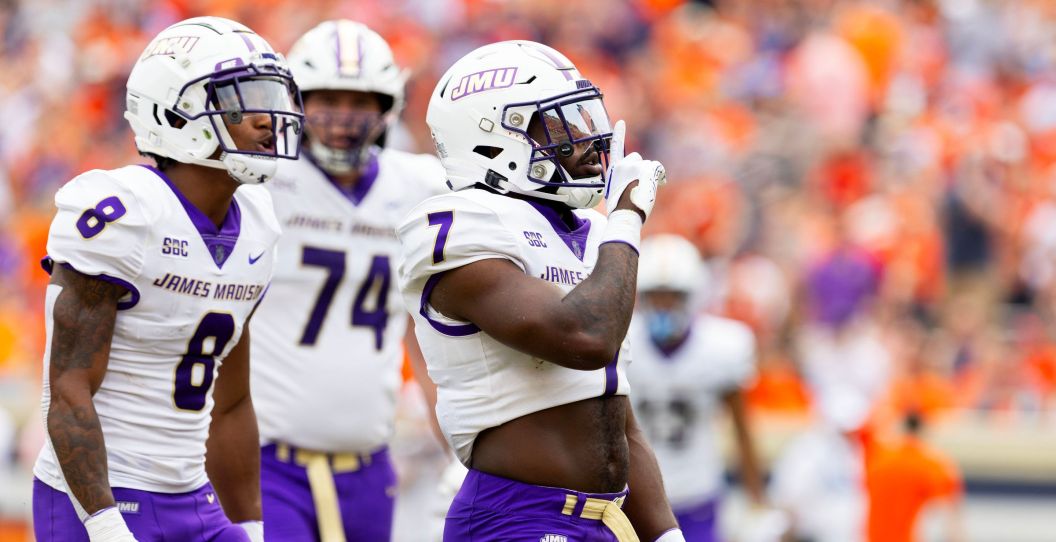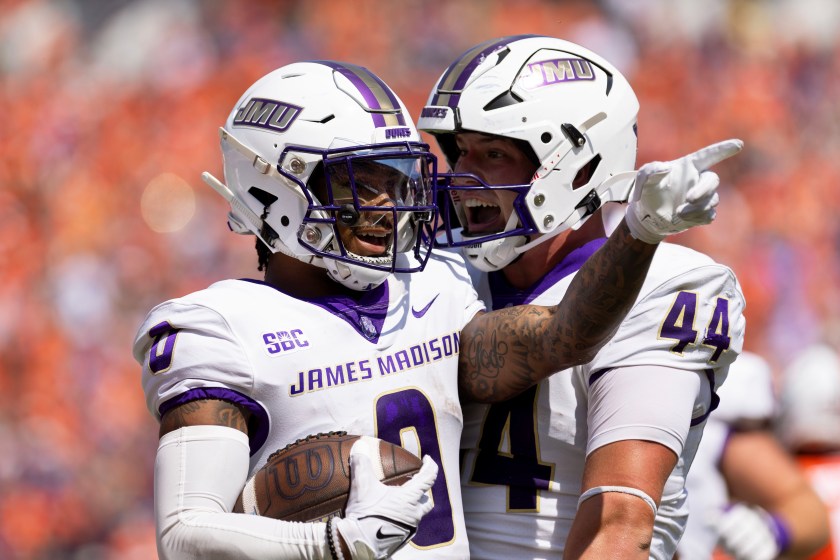Last year, there was patience. This year, not so much.
Videos by FanBuzz
James Madison's recent results in football are amplifying the noise in the college football world. Why is this program being excluded from the postseason for a second year when there is a precedent for other new Football Bowl Subdivision programs to get a waiver to play in a Year 2 postseason game? Hell, the Dukes are 15-3 in two seasons so far.
JMU's program and fan base understood it would be ineligible for postseason play in Year 1, 2022. That's the transition situation every school goes through in its first year after moving up a level.
The transition is meant to help the program adapt to the new level. Going from the Football Championship Subdivision level to the FBS — as James Madison did — can take some getting used to. Recruiting changes, for one; the number of scholarships rises; and there are some depth adjustments on the field. Also, a strong program such as JMU's goes from playing maybe one or two "dangerous games" at the FCS level to potential pitfalls at least every other week, if not every week.
But that's what has driven the 2023 frustration, especially in recent weeks. Since James Madison entered the FBS level at the beginning of last season, the Dukes have been pretty stout. That 15-3 record mentioned above includes a win over the Atlantic Coast Conference's Virginia. The Dukes come into this weekend undefeated in 2023 and engulfed by a national buzz, as the program just entered the AP Top 25 and American Football Coaches Association Coaches Polls.
The top competition for the Group of Five's potential spot in the New Year's Six schedule are programs such as nationally ranked Tulane and Air Force, but JMU so far is proving to be in that same tier. But it won't get that chance no matter how this year finishes up (unless there aren't enough eligible teams; only then would the NCAA allow JMU to go bowling). The NCAA won't allow JMU in, denying the waiver earlier this year.
James Madison football is 1 of 11 unbeaten FBS teams.
They’re 15-3 in their last 2 seasons. The NCAA won’t allow them to compete for a conference champ or a bowl game b/c they just transitioned to the FBS level.
JMU’s stats aren’t recognized. Pathetic excuse of an organization. pic.twitter.com/RG7A7EtOtm
— Jordan Moore (@iJordanMoore) October 20, 2023
"Their rationale for this two-year transitional process is that it gives schools opportunities to pull together their resources — and that's how many programs go into it," said Jonathan McNamara, who co-hosts the popular podcast "JMUSoundOff." "A lot of schools play a mix of FCS games when they transition, but JMU as a part of its process was very intentional. Its first season was a full Sun Belt schedule. The program felt that effort, combined with its infrastructure, made JMU a candidate for the waiver (to be bowl-eligible in Year 2 — 2023)."
That spring denial came with the explanation that granting JMU's waiver would set a precedent for other schools that weren't ready for the transition — schools that would bite off more than they could chew and falter as a result. The odd thing is, the NCAA has granted the waiver before.
But the counterargument has points, such as Liberty being granted a waiver in Year 2 even without a conference home. Also: Now that the $5 million rule is in place — the increased amount schools now must pay to move from the FCS to the FBS — how many "not ready" programs would really take the leap if not already completely prepared?
JMU seems like the rare exception the waiver rule was made for. In fact, James Madison's associate athletic director, Kevin Warner, tweeted this week that this week's Massey Rating for JMU was at No. 27 nationally. That's more than 50 spots ahead of the next-best Georgia Southern — when the Eagles were in their second FBS season about a decade ago. Most of the programs were rated in the 100s in their second seasons, which shouldn't surprise anyone.
Season not over, but Massey Rating of 2nd-year transition since 2000:
JMU 27
Jax St 90
Sam Houston 131
Liberty 115
Coastal 123
Charlotte 128
ODU 108
Ga Southern 83
App St 98
Ga St 125
South AL 122
UTSA 87
UMass 124
Texas St 115
WKU 118
FAU 118
FIU 115
Troy 108
USF 85
UConn 116— Kevin Warner (@KevinAWarner) October 24, 2023
"The biggest criteria (for the waiver) should be winning, and JMU is undefeated and beat a Power Five team (Virginia)," McNamara told FanBuzz. "One of the reasons I'm really frustrated by this is all the discussion, particularly during and after the pandemic, was that we needed to look out for the student-athletes and their mental health.
"And you're denying those student-athletes a chance to experience what they've earned a chance to experience."
The NCAA Not Recognizing Stats Hurts Players
Speaking of student-athletes, James Madison's individual statistical leaders are nowhere to be seen on the NCAA national stat leaders site either. JMU's Jalen Green has 13 sacks this year, but the listed national leader is Mohamed Kamara of Colorado State with 10.5. It isn't just the program that's being banned — it's the young men actually playing the game.
JMU's argument is that the NCAA is going to count the 20-9 loss that FBS-level Marshall was handed by the Dukes on Oct. 19 — along with the other losses the program has inflicted in 2023 — but at the same time the NCAA is going to act as if JMU's wins and its players' statistics don't exist.
Steve Brown, who is a founding member of the Alpha Dog football support group, joins McNamara as a co-host on the "JMUSoundOff" podcast. Not surprisingly, his sentiments match McNamara's.
"The bizarre part of it is ... we blew (the criteria) out of the water," Brown told FanBuzz. "You would think we don't see this every day, that this was an exception. JMU played a full FBS schedule in year one and did fine with it. JMU exceeded expectations, and the Sun Belt Conference bent over backwards to set things up for it.
"We started this journey in 2012 or 2013. We began to build the program to be a lower to mid-level G5 (Group of Five/FBS), like the North Dakota States, Montana schools, and South Dakota States are today, too. We were a middle-of-the-pack G5-level team as early as 2015. We've added to the stadium ... we've prepared for this."
It has gotten to the point where Virginia's attorney general and the state legislature have chimed in recently. State Senate Pro-Tempore L. Louise Lucas spoke on the matter this week; and last week, Virginia Attorney General Jason Miyares made a case to NCAA President Charlie Baker on JMU's behalf.
Baker's written response has been made public:
"(T)he current two-year transition period was intended to provide adequate time for schools to demonstrate they have met the necessary requirements to become an FBS member and adjust to the increased requirements for student-athlete support in addition to FBS competition," Baker wrote in response to Miyares. "This timeline is intentional and membership-driven and applies to all schools that transition from (FCS) to (FBS)."
Translation: We didn't make the rule, the schools did; we're just enforcing it. The only problem with that is the NCAA can grant the waiver if it so chooses — and it won't.
In the case of 2023 FCS-to-FBS newbies Jacksonville State and Sam Houston — which have had differing full-transitional-year experiences at 6-2 and 0-7 respectfully — both were good examples of programs that were perfect for the transitional rule as Baker describes it. But the JMU take at this point is that the Dukes were ready ahead of time and should be in the mix for a potential New Year Six bowl berth if they continue with this success — as Tulane did last season when it wrapped its season by knocking off Southern Cal in the Cotton Bowl.
"Liberty got a waiver in (Feb. 2017) and didn't even have a conference — and for Liberty, that was the right thing to do," Brown said. "For (JMU), lightning hit at the right time (before the $5 million rule was in place). ... This is the kind of exception that the waiver was made for.
"Why not applaud JMU for being a success? Just say you're going to give the waiver in this case. But instead, the NCAA has chosen to get in its hole and fight."

